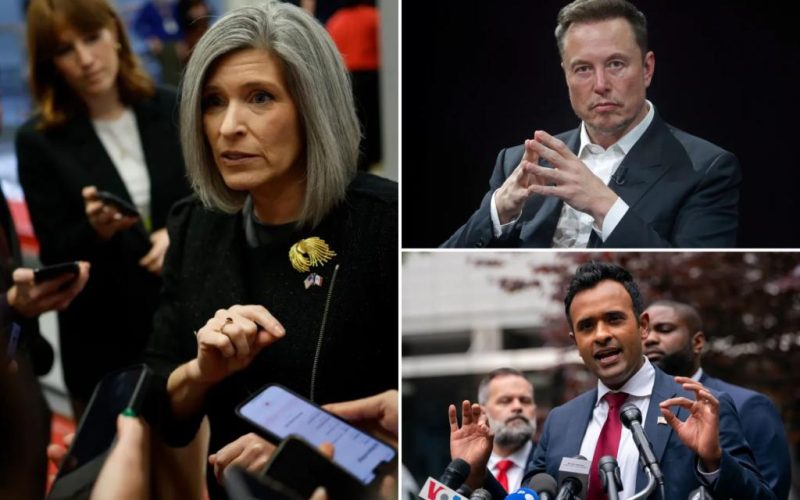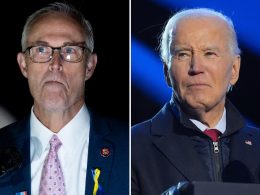They’re being remote-ly professional.
A paltry 6% of the federal workforce “report in-person on a full-time basis” while almost one-third of federal workers are remote on a full-time basis, in a sharp turn-around from the pre-pandemic era in which only 3% teleworked daily, a report from Sen. Joni Ernst’s (R-Iowa) office found.
Ernst, who has long crusaded against the rise in remote federal work, is planning to reveal the fruits of her office’s year-and-a-half inquiry to Department of Government Efficiency (DOGE) co-heads Elon Musk and Vivek Ramaswamy during their visit to the Capitol Thursday.
“The nation’s capital is a ghost town, with government buildings averaging an occupancy rate of 12[%],” Ernst wrote in the blistering report. “If federal employees can’t be found at their desks, exactly where are they?”
The Iowa Republican in particular blasted President Biden’s penchant for ditching the White House for his homes in Delawares or vacations with his rich donors.
“President Biden is setting the example. He was out of office 532 days over the last three-and-a-half years, about 40[%] of the time he was expected to be in the Oval Office,” she chided.
Her office collaborated with Open the Books, a non-profit group that advocates for government transparency for taxpayers and claims that the Biden administration redacted the “work locations of over 281,000 rank-and-file federal employees.”
Leasing and maintenance costs for federal office buildings as well as the tab to keep them running is about $15.7 billion annually, according to her report.
Meanwhile, the government has ownership of about 7,697 vacant buildings and 2,265 that are somewhat empty, costing about $15 million for leasing and maintenance of underutilized space, according to her report.
Blow to gov’t services
The Hawkeye State senator concluded that “taxpayers are getting ripped off” and claimed that her constituents were troubled by the lack of responsiveness from various government entities such as the Social Security Administration, Food and Drug Administration, and more
The report rattled through a handful of anecdotes to describe the lack of competence from the federal government.
She cited an example of a whistleblower report at the FDA that was unread for months warning about bacteria spreading in baby formula, which ultimately culminated in a national shortage back in 2022.
Another example cited in the report was a Department of Veterans Affairs manager in Atlanta who snapped a photo of himself “working” while taking a bubble bath, stirring outrage at the time.
“If you think that this is not a big deal then what is a big deal? Is it a big deal when a veteran dies?” one of his colleagues later fumed, according to the report.
One federal employee bemoaned that “he is one of few who reports to the Washington, DC, office, and contractors have commented to him about the whereabouts of agency employees,” per the report.
Improper pay boosts
To further her point about taxpayers “getting ripped off,” Ernst cited findings that some federal workers are cashing in on higher pay rates from localities where they are not actually working.
“My audits are finding as many as 23[%] to 68[%] of teleworking employees for some agencies are boosting their salaries by receiving incorrect locality pay,” her report found. “Some employees live more than 2,000 miles away from their office and one ‘temporary’ teleworker collected higher locality pay for nearly a decade.”
Over 25% of federal teleworkers on a daily basis live over 50 miles away from the workplace, a US Office of Personnel Management found.
“Government salaries are determined, in part, by the locations of an employee’s official worksite. There are 58 locality pay areas with base pay for federal employees adjusted to account for the cost of living in each,” the report noted.
Union resistance
Ernst faulted federal employee unions for hampering efforts to compel workers to report on-site for their jobs.
Last year, the Biden administration demanded agencies “substantially increase meaningful in-person work
at Federal offices,” but the report recounted that some union bosses shrugged that off.
“The administration’s new guidance on agency work environments does not override collective bargaining agreements in effect at the agencies where we represent frontline employees,” National Treasury Employees Union National President Tony Reardon said in response at the time.
“This means that for the vast majority of our members, their access to telework — which varies among agencies and types of jobs — will remain unchanged.”
Solutions
To rectify the situation, Ernst proposed spreading the federal workforce across the country, enacting a “use it or lose it” approach to federal properties, tying permissions for remote work to performance, and monitoring their locations based on virtual private networks (VPNs), among other steps.
Last month, Ernst was announced as the chair of the Senate DOGE Caucus, which will collaborate the epynonymous nongovernmental organization led by Musk and Ramaswamy to take a sledgehammer to government bloat and inefficiency.
On Thursday, the Senate DOGE Caucus will have its first meeting to coincide with Musk and Ramaswamy’s visit to the Capitol.








